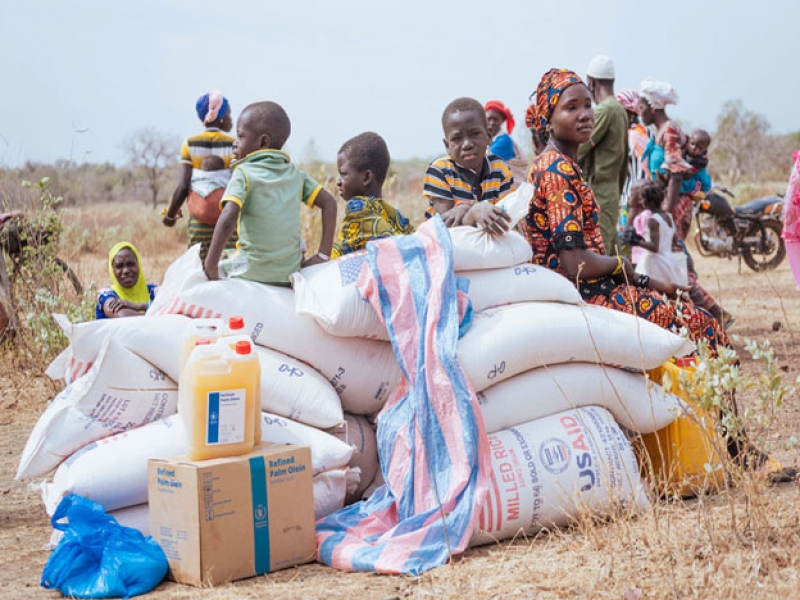- US Issues Travel Alert for Bangladesh Ahead of Election |
- Air ambulance carrying bullet-hit Hadi flies for Singapore |
- Can Dhaka’s arms recovery drive ensure peaceful polls? |
- ‘Unhealthy’ air quality recorded in Dhaka Monday morning |
- BD peacekeepers' deaths: UN chief calls Dr. Yunus, offers condolence |
USAID Cuts Leave Millions at Risk of Hunger and Disease

Vulnerable populations in Morolaba, Burkina Faso, receive emergency airlifted food assistance. Credit: Desire Joseph Ouedraogo
In January 2025, President Trump signed an executive order that triggered a massive rollback in global humanitarian assistance. The decision to slash U.S. international aid by 83% is already costing lives, deepening suffering in the world’s most fragile regions.
Until this drastic shift, the United States was the world’s largest humanitarian donor, contributing an estimated $64 billion in 2024—about 42% of global humanitarian aid. Now, nearly 5,800 grants have been cancelled, leaving only around 500 operational programs.
Even before these cuts, a child died from hunger-related causes every 11 seconds. Now, according to the 2025 Global Report on Food Crises, over 295 million people faced acute hunger last year—the sixth consecutive annual rise—driven by conflict, displacement, and climate shocks.
Across the globe, the effects are devastating: In Afghanistan, nearly 400 nutrition sites and over 400 health centres have shut down. Public hospitals in Kabul and Badakhshan were forced to turn away severely malnourished children until a temporary EU-funded reopening. Over 29,000 people have lost access to emergency food and cash support.
In Madagascar, four years of drought and now shuttered mobile clinics have left 3,000 children without treatment for severe acute malnutrition. Two treatment centres have closed, and 200 staff have been laid off.
In Mozambique, conflict-hit Cabo Delgado has seen staffing slashed and support for 17,000 people withdrawn after U.S. aid halted.
In the DRC, where U.S. aid made up 70% of humanitarian funding, health centres now charge fees families can't afford. Three women die every hour from pregnancy-related complications, and these cuts leave no safety net.
Despite the administration’s claims of “fiscal responsibility,” foreign assistance represents just 1% of the U.S. federal budget. Its impact, however, is profound—each dollar spent combating undernutrition yields up to $81 in economic returns. Programs like the now-defunded Famine Early Warning Systems Network (FEWS NET), which once saved millions through proactive crisis response, are silent.
Former USAID Acting Administrator Marco Rubio once acknowledged: “We invest in aid not only because we’re a compassionate people, but because it’s in our national interest. A freer, more just and prosperous world poses less of a threat.”
Foreign aid isn’t charity—it’s an investment in global stability, shared security, and economic resilience. Thanks in part to consistent humanitarian support, deaths from hunger-related causes among children dropped 60% over the last 45 years. That progress is now at risk.
Worse, the Administration’s handling of exemptions for "life-saving" programs has sown confusion and chaos. Promised exceptions have not materialised, pushing NGOs to drain reserves or shutter programmes altogether. The damage extends beyond individual projects—entire humanitarian networks are collapsing. Thousands of aid workers have lost their jobs, leaving vast service gaps across vulnerable communities.
The need has never been greater. Over 300 million people worldwide now require humanitarian assistance, and nearly 733 million suffer from hunger. One in three people globally face food insecurity. Meeting urgent needs in 2025 alone will require $44.7 billion.
But the sudden withdrawal of U.S. funding has opened a catastrophic gap. Other donors cannot fill it fast enough.
History proves that U.S. leadership can change the world. The Marshall Plan rebuilt post-war Europe. Plan Colombia stabilised a country plagued by violence. The 2014 U.S.-led Ebola response prevented a global pandemic.
Congress must act now. As it drafts next year’s federal budget, lawmakers must restore or increase foreign aid funding—and hold the Administration accountable to spend it as appropriated. Global stability, economic growth, and America’s moral leadership depend on it.
America has always been at its best when we lead with generosity.
Now is not the time to retreat. With the right commitment, we can end chronic hunger—for everyone, for good.

